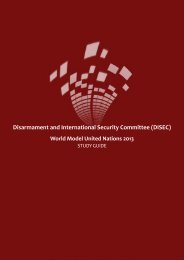Social, Humanitarian and Cultural Committee (SOCHUM)
Social, Humanitarian and Cultural Committee (SOCHUM)
Social, Humanitarian and Cultural Committee (SOCHUM)
You also want an ePaper? Increase the reach of your titles
YUMPU automatically turns print PDFs into web optimized ePapers that Google loves.
drive minority languages into the private sphere<br />
<strong>and</strong> insist on the use of the majority language in<br />
administration, education, <strong>and</strong> commerce. this logic<br />
has led to the drastic reduction of living languages<br />
in Europe, where most countries currently have one<br />
dominant language that every resident is expected to<br />
know. 25 In France, for example, there were a number<br />
of independent communities that had their own<br />
language before the French Revolution, including the<br />
Bretons, Alsatians, <strong>and</strong> the Occitanians. in order to<br />
unify France under their control, the revolutionaries<br />
instituted French, which was the language of highest<br />
prestige at the time, as the official language of the<br />
state. Since 1800, the numbers of speakers of Breton,<br />
Alsatian, <strong>and</strong> Occitan have dropped precipitously,<br />
such that Breton <strong>and</strong> Occitan are considered to be<br />
severely endangered languages today. 26 in defense<br />
of the idea of a unifying language for a successful<br />
state, many point to Canada, india, <strong>and</strong> Belgium as<br />
countries where linguistic <strong>and</strong> ethnic conflicts have<br />
arisen after multiple language communities were<br />
allowed to exist. 27<br />
interestingly, it is not only the attitude of states<br />
against minority languages that leads to language<br />
endangerment, but also the self-perception of many<br />
minority language speakers that their language is<br />
inferior in some way. A good example of this negative<br />
self-perception can be found among the speakers of<br />
Haida <strong>and</strong> Tlingit in Southeast Alaska in the United<br />
States. Many Haidi <strong>and</strong> Tlingit speakers believe that<br />
God does not like their languages, an idea that was<br />
perpetuated by church officials during the conversion<br />
of the native population of the region. While churches<br />
generally do not encourage this belief today, Christian<br />
missionaries have spread the idea that God does<br />
not like many indigenous languages throughout the<br />
world, <strong>and</strong> this view still remains in many areas. 28<br />
Speakers of Haida <strong>and</strong> Tlingit also express shame <strong>and</strong><br />
embarrassment toward their own languages. Older<br />
speakers often recall memories of being punished<br />
in school for using their indigenous language <strong>and</strong><br />
thus do not encourage the younger generations to<br />
learn <strong>and</strong> utilize the language. Many believe that<br />
they are backwards or undeveloped for speaking an<br />
indigenous language. 29 This negative perception of<br />
their own language is often encouraged by the fact<br />
that many of these languages lack an established<br />
written literature, which makes them seem inferior<br />
to the dominant language. 30 Many parents also<br />
think that the differences between their indigenous<br />
languages <strong>and</strong> English prohibit a child from learning<br />
both languages successfully, so they do not pass<br />
Haida or Tlingit to their children <strong>and</strong> do not support<br />
programs to protect these endangered languages. 31<br />
This negative self-perception that many endangered<br />
language speakers have toward their mother tongue<br />
emerges ultimately from the attitudes of the state<br />
<strong>and</strong> dominant language speakers. 32 Dressler provides<br />
a model for linguistic endangerment that effectively<br />
exemplifies the connection between state <strong>and</strong> majority<br />
language attitudes <strong>and</strong> such negative self-perception.<br />
According to his model, minority language speakers<br />
undergo social subordination by dominant language<br />
speakers through restricted access to education,<br />
public services, <strong>and</strong> employment. This subordination<br />
leads minority language speakers to internalize the<br />
stigmatization of their language <strong>and</strong> to develop a<br />
negative perception of their mother tongue. Because<br />
of this negative self-perception, speakers of minority<br />
languages often restrict the use of their language to a<br />
small set of domains, usually in the private sphere. This<br />
restriction leads to endangerment as speakers begin<br />
to ab<strong>and</strong>on the language. Finally, the fact that their<br />
language is endangered reinforces the community’s<br />
negative self-perception, making the model cyclic. 33<br />
in addition to the myth of the nation state,<br />
certain other commonly held beliefs contribute to<br />
state policies against minority languages <strong>and</strong> to the<br />
15<br />
Melbourne Host Directorate PTY LTD | Office of Media <strong>and</strong> Design

















